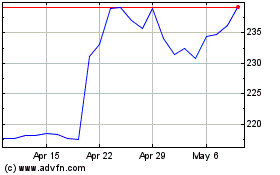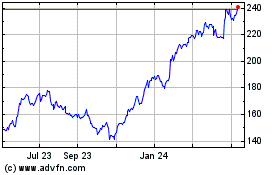By AnnaMaria Andriotis | Photographs by Andrew Spear for The Wall Street Journal
The American Express Co. saleswoman had finally convinced Bryan
Daughtry to apply for a card. There was just one thing: She had to
run a credit check.
Mr. Daughtry, who owns a disaster-cleanup company in Ohio,
balked. He was trying to get a mortgage and didn't want the inquiry
to dent his credit score. She refused to stop the process, he said,
checked his credit, and his application was approved.
"That left a bad taste in my mouth," said Mr. Daughtry.
Some AmEx salespeople strong-armed business owners like Mr.
Daughtry to increase card sign-ups, according to more than a dozen
current and former AmEx sales, customer-service and compliance
employees. The salespeople have misrepresented card rewards and
fees, checked credit reports without consent and, in some cases,
issued cards that weren't sought, the current and former employees
said.
An AmEx spokesman said the company found a very small number of
cases "inconsistent with our sales policies." "All of those
instances were promptly and appropriately addressed with our
customers, as necessary, and with our employees, including through
disciplinary action," he said.
"We have rigorous, multilayered monitoring and independent
risk-management processes in place, which we continuously review
and enhance to ensure that all sales activities conform with our
values, internal policies and regulatory requirements," he said.
"We carefully examine any issues raised through our various
internal and external feedback channels and audits, and we do not
tolerate any misconduct."
Current and former employees said the dodgy sales tactics date
to at least 2015, when AmEx was scrambling to retain Costco
Wholesale Corp. small-business customers after the warehouse club
ended their long-running partnership.
The deal's demise was a huge blow to AmEx. For 16 years, the
warehouse club didn't accept credit cards in its stores from any
company but AmEx. AmEx also issued credit cards branded with the
Costco logo that offered special perks.
Small businesses were a particularly valuable slice of the
Costco cohort. The warehouse club sells a lot of things they need
-- two-liter jugs of olive oil, bulk cleaning supplies, big-screen
TVs, tires for their delivery vans. AmEx was about to lose the
stream of fees on all of those card purchases.
Customers were also free to use their Costco-branded cards
elsewhere, and they did. Kenneth Chenault, then AmEx's chief
executive, said that about 70% of spending on the Costco cards were
non-Costco purchases. Those fees would go away, too.
The potential revenue hit from the loss of the Costco customers
was enormous, so AmEx launched an aggressive campaign to keep them.
The push ushered in an era of escalating sales goals and hefty
commissions that persists today.
Mr. Daughtry said he didn't seek out the AmEx card. The
saleswoman called his office numerous times over several weeks last
spring before she finally got him on the line. Although he said he
never consented to the card, he got a $250 bill for its annual fee
in the mail.
He called to complain. "I told them I wouldn't stand for it, and
I would take some type of action," Mr. Daughtry said. AmEx agreed
to drop the charge.
Known for courting well-heeled consumers, AmEx also relies
heavily on its business customers. It derives about 30% of its
revenue from the services it sells to a range of companies -- from
mom-and-pop shops to multinational corporations.
AmEx is the largest business-card issuer in the U.S., according
to the Nilson Report. Small businesses are an especially important
constituency; AmEx has said its small-business card portfolio is
larger than that of its nearest five competitors combined.
The task of retaining Costco customers initially fell to about a
hundred AmEx salespeople in Phoenix. The "top client acquisitions"
group employees were told that the Costco retention program --
Project Lincoln -- was a once-in-a-lifetime opportunity to make big
money. Their task: dial up Costco business-card holders and
convince as many as possible to sign up for AmEx business
cards.
The dial-for-dollars strategy worked. AmEx managed to hang onto
a big chunk of the Costco customers. Within six months of the push,
some salespeople had earned commissions of $50,000 to $100,000,
according to current and former employees. BMWs and other high-end
cars began appearing in the office parking lot.
Some salespeople took shortcuts to get there, current and former
employees said.
Salespeople are required to call customers on their recorded
desk lines, but some placed calls from personal cellphones, often
while standing in a breezeway between two buildings on AmEx's
Phoenix campus, according to current and former employees. Senior
managers sometimes closed sales on their unrecorded desk lines.
There were red flags. Some 40% to 45% of cards that were being
mailed out as part of Project Lincoln were being activated,
according to a 2015 presentation by a senior employee in the
division -- well below the typical rate of at least 60%. Phoenix
salespeople were earning the highest commissions, but the accounts
they had opened had the lowest usage rates of any other group, said
people familiar with the presentation.
An executive at the company's headquarters in New York flagged
the low activation rates to senior sales employees in Phoenix,
according to people familiar with the matter. Commissions were
scaled back, and some salespeople suspected of dicey behavior were
fired, the people said.
The Costco retention campaign ended in 2016, but the problematic
sales practices didn't, current and former employees said.
Salespeople who had grown accustomed to the big commissions from
the retention program were back to mostly relying on cold calls to
meet their now-higher monthly sales targets.
Salespeople sometimes told hesitant business owners they would
send informational "welcome kits" in the mail. Instead, they used
Social Security numbers and addresses gleaned from customer
databases to submit applications on the business owners' behalf.
The "welcome kits" were simply the cards and their associated
paperwork.
It didn't take long for senior sales employees to begin spotting
the same practice at another AmEx office in Florida focusing on
business-card sales, they said.
Some employees tried to warn higher-ups about the questionable
tactics. In early 2017, a saleswoman contacted Susan Sobbott, at
the time president of global commercial services. She connected the
saleswoman with employees in human resources and risk management so
they could investigate the allegations.
When human-resources staff reached out to the employee's
manager, he denied the saleswoman's allegations and said she was
underperforming. The employee later left the company. The manager
was later promoted. Ms. Sobbott has since left AmEx.
"The senior leader appropriately referred the matter to
independent groups outside the business, who then investigated the
allegations and found them to be unsubstantiated," the AmEx
spokesman said.
Around this time, AmEx was conducting a broad review of its
sales tactics. After Wells Fargo & Co. disclosed in September
2016 that branch employees had opened fake accounts without
customer consent, the Office of the Comptroller of the Currency
asked AmEx and other banks it oversees to make sure their employees
weren't doing the same thing.
AmEx reviewed calls from desk phone lines of sales staff between
2014 and 2017 and found evidence of misleading behavior, according
to people familiar with the matter. Some customers were told their
cards were being upgraded when they were being given new cards;
others received more cards than they sought. Salespeople skipped
over required disclosures and, in some cases, falsely told
customers their credit wouldn't be checked, the people said. Cards
also had been issued without customer consent, they said.
AmEx told the OCC it found few cases of inappropriate sales
tactics, the people said. The company reprimanded or fired a small
number of employees and asked credit-reporting firms to remove
inquiries from the credit reports of customers who didn't consent
to the checks, they said. AmEx asked customers who received cards
they didn't authorize if they wanted to keep them, the people
said.
The review didn't capture calls made from employees' cellphones,
nor did it catch those made by senior sales staff on unrecorded
lines, according to people familiar with the matter.
An AmEx spokesman said the company "found no evidence of a
pattern of misleading sales practices."
Last year, the OCC listened to some AmEx sales calls and found
evidence of misconduct, according to people familiar with the
matter.
AmEx said the business-card sales teams were responsible for
around 0.25% of 65 million new cards issued by the company
world-wide between 2014 and 2019, or about 162,500 cards. "Less
than 0.25% of the group's sales activities have been identified by
us as inconsistent with our sales policies," a spokesman said.
As recently as last year, AmEx's customer-service department
fielded complaints from business owners who said they had received
cards they didn't sign up for, according to people familiar with
the matter. Some of those calls made their way to the company's
executive escalations department, some of the people said. Angry
customers were often offered extra rewards points to drop their
complaints, they said.
Customers also complained that salespeople misled them about
card fees and rewards, current and former employees said.
Abdelnasser Abdeen said a salesperson told him he wouldn't be
charged an annual fee if he didn't activate his AmEx card. Soon
after the card came in the mail last year, he got a bill for $295.
When he called to complain, Mr. Abdeen said he was told the card
rewards would more than cover the fee.
"They were pushing to sell me that card," said Mr. Abdeen, who
owns a used-car dealership in northern Virginia. "I didn't like
that." He canceled the card and signed up for a different type of
AmEx card. He said he isn't getting the rewards points he was told
he would get.
In the fall, an AmEx salesman convinced Glen Vitale to take out
six business cards with an unusually generous offer of four rewards
points per dollar on certain spending categories for the first
$150,000 spent. He said he was led to believe he would pay a single
annual fee of $295 for all the cards.
Mr. Vitale, an executive at an auto-parts manufacturer in
Pompano Beach, Fla., began using one of the cards right away. The
salesperson emailed to ask whether he would make a small purchase
with the others to test their security chips.
Soon after, Mr. Vitale said he got six separate bills for $295
each. The salesperson told him the rewards would more than cover
the cost.
"I said, 'I hope you're right,' and I went on with my business,"
he said. AmEx recently fired the salesman.
Write to AnnaMaria Andriotis at annamaria.andriotis@wsj.com
(END) Dow Jones Newswires
March 01, 2020 10:14 ET (15:14 GMT)
Copyright (c) 2020 Dow Jones & Company, Inc.
American Express (NYSE:AXP)
Historical Stock Chart
From Mar 2024 to Apr 2024

American Express (NYSE:AXP)
Historical Stock Chart
From Apr 2023 to Apr 2024
